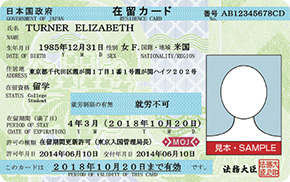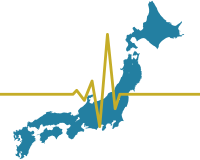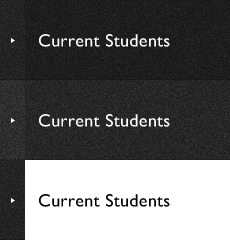Information on Living in Japan for International Students
Status of Residence and Resident Card

According to the new residency management system in place since July 9, 2012, foreign nationals residing in Japan are issued a Resident Card in place of the Alien Registration Certificate. The Resident Card is issued by the Immigration Bureau to individuals staying in Japan mid- to long-term (for more than 3 months), and contains information such as the entry permit and extension of period of stay. Tokyo Tech students have a Student resident status.
The Resident Card is an important document that will serve as proof of identification when you open a bank account, sign a cell phone contract, and rent an apartment. Please carry your card at all times. (Holders are legally required to carry the card and present it when requested.)
Flow of the Residency Management System
-
 Port of departure and entry
Port of departure and entry- A Resident Card is issued at immigration to individuals entering Japan with a mid- to long-term resident status.
-
 Local government office
Local government office- Resident Card holders are required to notify the local government office within 14 days of determining their new address.
-
 Immigration Bureau
Immigration Bureau- In the event of changes other than address, visit the Immigration Bureau and have the information updated.
Banks

Services at Japanese banks and financial institutions include remittances and transfers in Japan, remittances overseas, and currency exchange. Anyone of any nationality may open a bank account. And with a bank account, you can withdraw money from savings and receive remittances from overseas.
To open an account, you will need an official document (e.g., Resident Card), identification (e.g., passport), and seal (depending on the institution). Rules vary. For details, inquire at the different institutions.
Banks near Tokyo Tech
Postal Services

To ensure that you receive letters from your home country and notification from your local government office, please follow the guide below.
- Enter the 7-digit postal code
- Include the apartment name and room number accurately in your address (for a room on rent or homestay, also include the owner's name, e.g., c/o Mr. A).
Japan Post English service (call charges apply)
0570-046-111 (Hours: Weekdays 8:00 - 22:00; weekends and holidays 9:00 - 22:00)
Utilities
-
- Electricity
- When moving in to new accommodation, turn on the breaker so that you receive electricity. Find the electricity application form either in your mailbox or room, fill in the necessary details, and send it to your local electric utility.
-
- Gas
- To use gas, contact your local gas utility in advance to have your gas valve opened.
-
- Water
- To use water, file an application at the water department of your local government office. Most apartments and condominiums will have the water turned on when you move in.
Trash Separation and Disposal

Local government offices in Japan set explicit rules for disposing of household trash. Trash must be separated as instructed and taken to a specified pickup point at a specified time, otherwise it will not be collected. Separation and disposal rules vary by local government. Please check the rules of your area before moving in.
Example: Trash disposal in Tokyo
Combustible trash (twice a week), non-combustible trash (twice a month), recyclable trash (once a week), oversized trash (arranged pickup for a fee)
Emergencies
-
- Ambulance and Fire Department
- In the event of sudden illness or serious injury in which you cannot make it to the hospital on your own, call the fire department for an ambulance. If you cause or witness a fire, also call 119 for firefighters. (The number can be reached free of charge from any phone, whether landline, cell phone, or public payphone.)
-
- Police
- Every community in Japan has a Koban police booth manned by police officers 24 hours a day. If you lose or find money or other items, or witness a crime, report it to the nearest Koban or police department. In the event of an emergency, call 110 for the police. (The number can be reached free of charge from any phone, whether landline, cell phone, or public payphone.)
Health Insurance

All international students residing in Japan for more than 3 months are required to join National Health Insurance. Once enrolled, you will be required to pay only 30 percent of medical expenses. (Note, however, that certain types of treatment are not covered and you will be required to pay the full cost.)
Follow procedure to join National Health Insurance at the department of the local government office at which you completed resident registration. Present your Resident Card or Alien Registration Certificate. A National Health Insurance Card will be issued at a later date. When visiting a hospital for treatment, always carry your National Health Insurance Card.
Driver's License

By applying for a screening and driving exam at a designated center, you may convert a driver's license issued in your home country to a Japanese license.
- [Designated centers in Tokyo]
- Fuchu Driver's License Center, Samezu Driver's License Center, Koto Driver's License Center
Alternatively, you may drive in Japan with an International Driving Permit issued by a member state of and conforming to the model designated by the Geneva Convention on Road Traffic.
Disaster Preparedness

In the event of an earthquake or other disaster, protecting yourself is the first priority. Once you are safe, make efforts to gather accurate information from the websites of Tokyo Tech and your local government.
Large Earthquake Response Manual (English)
Campus Guide for International Students
The guide compiles information on systems and procedures relevant to international students.
The PDF files present information in both Japanese and English.


